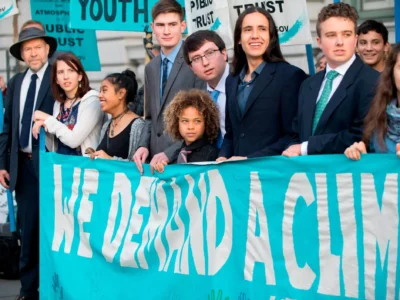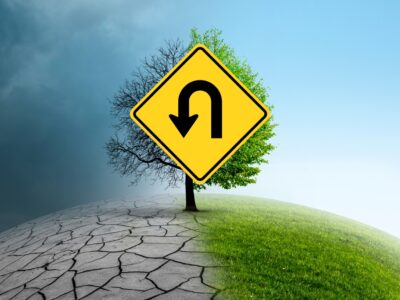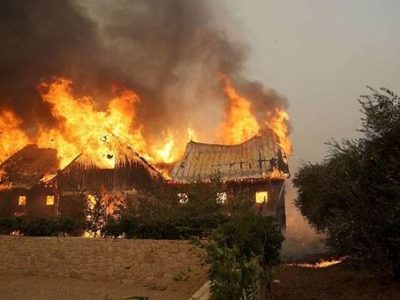How the ICC is Using International Criminal Law to Prosecute Suspects of Eco Crimes
Guest contributor Aria Burdon Dasbach writes that the International Criminal Court is in the process of weighing dozens of suggestions for how to go after global environmental crimes.

There are many different ways that our global society has attempted to address environmental damage and climate change. We fund climate technology startups. We elect representatives that keep the climate in mind. We start nonprofits dedicated to reestablishing our collective sustainable relationships with earth systems. And we litigate in civil and federal courts at the national level when environmental rights have been violated. Yet the climate change clock continues to tick, and we are faced with the reality of this multifaceted and increasingly alarming problem: we need many different tools at our disposal to change the trajectory of our environment. One new set of tools that legal experts are proposing we consider are those available under international criminal law.
On February 7, 2024, Karim Khan, the Prosecutor of the International Criminal Court (ICC) announced a new policy initiative to advance accountability for environmental crimes under the Rome Statute. Rather than modifying the founding statutes, the Prosecutor is seeking to try suspects for crimes within the Court’s existing jurisdiction committed by means of, or that result in, environmental damage. At the ICC, the Office of the Prosecutor conducts preliminary examinations, investigations, and prosecutions of perpetrators of genocide, crimes against humanity, war crimes, and the crime of aggression. The Prosecutor announced a call for comments to help develop the policy initiative and advise on the resulting paper. That call invited comments on: what specific crimes within the Court’s jurisdiction should be included in the policy paper; how to understand and apply the applicable modes of participation in those crimes; best practices for investigating and prosecuting crimes that can be committed by means of or that result in environmental damage; and how to consider environmental crimes when putting into practice the principle of complementarity and engaging in international cooperation.
The Promise Institute Europe, led by Executive Director and UCLA Law Professor Kate Mackintosh, gathered a group of students, faculty and interested practitioners from UCLA Law and beyond to help compile these consultation phase comments. I was part of the UCLA Law student group, along with Hannah Reynolds (J.D. ‘26) and Selina Novak (Doctoral Program in Law Exchange Student Researcher). We worked with ICC Special Advisor Kevin Jon Heller and Appeals Counsel Reinhold Gallmetzer who are currently drafting and editing the Office of the Prosecutor’s policy paper to ensure that the summation of the comments fit with the overall mission. The deadline for submissions was March 16, 2024, and now the Office of the Prosecutor (OTP) is producing a draft of the policy to include the consultative points summarized by the students’ analysis.

For our part, students were assigned certain submissions to pull key themes from and summarize so that the consultative process would be more manageable for the OTP. We received a wide range of submissions. We noted the diversity and uniqueness of every comment, all seeking to address the same questions. We attributed this to the multifaceted nature of those interested in providing consultative comments as well as the far reaching impacts of environmental damage.
The result of our work was a memo outlining the highlights of the submissions, as well as a detailed overview of responses meant to serve as a reference guide for the OTP in its drafting process.
The need for a new OTP policy on prosecuting actors engaged in environmental damage is clear. It comes at a time when our global society is increasingly recognizing the imperative nature of utilizing all tools at our disposal to address climate change. In 2016, former ICC Chief Prosecutor Fatou Bensouda claimed the court would focus on ecological damage and illegal exploitation of natural resources, yet little resulted from this claim. Prosecutor Khan, on the other hand, appears to view his initiative as a concrete policy, rather than a promise or hope. In highlighting the importance of the new policy and stakeholder consultation, Prosecutor Khan stated: “Damage to the environment poses an existential threat to all life on the planet. For that reason, I am firmly committed to ensuring that my Office systematically addresses environmental crimes in all stages of its work, from preliminary examinations to prosecutions.” By taking this step, the Prosecutor will be the first in the ICC’s history to consider the forms that environmental crimes can take. As the ICC is reserved for and regarded as the Court for the adjudication of the most serious crimes, the gravity and novelty of including and prioritizing environmental crimes in this docket cannot be understated.
The connection between international criminal law and environmental law has become ever more prominent as environmental damage due to climate change and institutional blindness forges on with building ferocity. There is a growing recognition that severe environmental damage resulting from acts such as large-scale pollution, deforestation, illegal wildlife trade, and blanket bombing, can also constitute international criminal crimes already on the books, such as crimes against humanity, or war crimes. Moreover, environmental degradation often leads to human rights violations, such as displacement of communities, loss of livelihoods, and adverse health effects. International criminal law intersects with environmental law when such violations are severe and systematic, leading to prosecution under international human rights law. Many environmental issues, such as air and water pollution, climate change, and biodiversity loss, have transboundary impacts. International criminal law may be invoked when states or individuals engage in activities that knowingly harm the environment in a way that affects neighboring countries or the global community. International criminal law can also hold individuals, including government officials, accountable for actions that result in significant environmental harm. Additionally, there’s a growing discourse on the responsibility of corporations for environmental crimes, with calls for legal frameworks to hold corporate entities accountable for their environmental impacts.
Recognizing environmental harm as a potential precursor to conflict or humanitarian crises, international criminal law can play a role in preventing such situations by deterring individuals or states from engaging in activities that cause significant environmental damage. As the intersection between international criminal law and environmental law evolves, new legal principles and norms are emerging. The inclusion of a potential fifth Rome Statute Crime of Ecocide is one of these new legal principles. Ecocide proposes the criminalization of severe and either widespread or long-term environmental damage, going further than simply utilizing existing crimes to fit environmental damage by giving power to and naming ecocide as its own crime.
 Adding a crime to the Rome Statute is, however, no easy feat. In fact, since the Court’s inception in 1998, the only amendments made to the Statute have been amendments to existing crimes – never before has an entirely new crime been proposed and accepted. The amendment process is such that any state party can propose an amendment with it adopted by a two-thirds majority vote. The amendment then comes into force for those States Parties which have accepted it one year after the deposit of their instruments of ratification or acceptance.
Adding a crime to the Rome Statute is, however, no easy feat. In fact, since the Court’s inception in 1998, the only amendments made to the Statute have been amendments to existing crimes – never before has an entirely new crime been proposed and accepted. The amendment process is such that any state party can propose an amendment with it adopted by a two-thirds majority vote. The amendment then comes into force for those States Parties which have accepted it one year after the deposit of their instruments of ratification or acceptance.
While the proposition of Ecocide gains steam, we must recognize and celebrate the win at hand: the Court for the world’s most severe crimes is prioritizing a policy initiative that will help save the environment and deter further damage. As legal practitioners, scholars, and students, we have a long road ahead, but this policy paper and its consultative process can serve as hope that we are headed in the right direction.
Guest contributor Aria Burdon Dasbach is a J.D. candidate at UCLA Law (’25) specializing in International & Comparative Law and Critical Race Studies.








This sounds good in theory, but unfortunately, “environmental crimes” has been used as a cudgel to punish Israel, to the exclusion of its aggressors in the region. Mr. Khan’s insistence on including “war crimes” generally in the definition has me concerned here. Not that Israel has committed war crimes, but again, that’s been a dogwhistle for antisemitism, under the guise of antizionism. For example, curiously, Communities for a Better Environment decided to enter the international foreign policy sphere by sponsoring California’s first Hamas-sponsored city council resolution. Numerous environmental / environmental justice organization have followed suit with vocal support for Hamas adjacent groups and ideologies – including Greenpeace USA and 360.org. To be clear, war hurts the environment. But its the singular focus on the one Jewish state’s actions that is troubling. For example, since 2005, Hamas has launched 13000 rockets a year at Israel. It is estimated that almost 10% don’t reach their target, but land on Gaza. Yet, not one environmental justice organization has called out Hamas for the EJ implications of bombing their own impoverished people, about 1,300 times a year. Overall, it diminishes and discredits environmental organizations, particularly ones with a supposedly local focus (CBE, CRPE) to venture out of their lane into international foreign policy. Intersectionality has its limits. Therefore, given the visible antisemitism and antizionism in the environmental movement, without an explicit recognition that any international “ecocide” movement will NOT target Israel, the Jewish people, and Zionists, then I cannot support this movement, and I would urge all other Jews, Zionists, and decent civil rights supporting environmentalists to reject it as well. Also, not afraid to put my name on this comment, or rather, I expect the antisemitism to which I have been exposed to follow, but no longer care. I’d rather the bigots come out into the open. And perhaps I’ll find fellow-travelers as well.
Excellent article! I look forward to seeing the criminalization of severe and either widespread or long-term environmental damage in the RS. It’s one of the most urgent issues of our generation and beyond and we need good international law so that everyone can benefit.